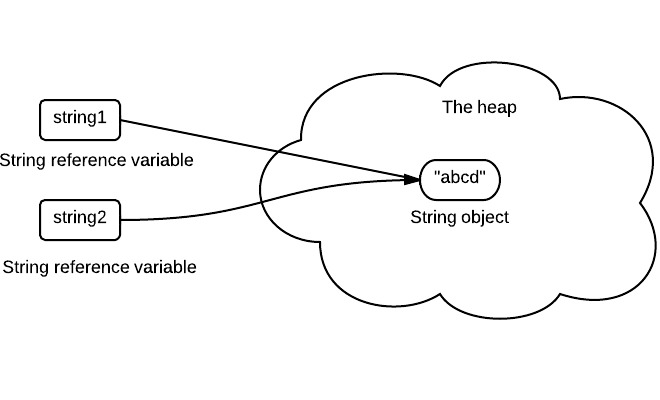Why Are Strings Immutable in Java? Comprehending the Core Principles
Why Are Strings Immutable in Java? Comprehending the Core Principles
Blog Article
Immutable Strings: A Trick Part in Ensuring Data Uniformity and Integrity
In the world of data administration, the value of unalterable strings can not be overemphasized. The idea of immutable strings goes beyond plain technicality; it is a linchpin in the complex web of data administration.
The Concept of Immutable Strings
Unalterable strings, a basic concept in programs, refer to strings that can not be customized once they are created. Fundamentally, when a string value is designated, any procedure that appears to change the string actually produces a brand-new string. This immutability makes sure information consistency and integrity in applications, as it avoids unanticipated adjustments to the initial information.
Benefits in Information Uniformity

Data consistency is crucial in different facets of software program advancement, including database administration, multi-threaded environments, and dispersed systems (Why are strings immutable in Java?). Unalterable strings contribute significantly to attaining this uniformity by preventing information corruption because of concurrent gain access to. In scenarios where numerous processes or threads interact with the very same data at the same time, immutable strings function as a protect versus race problems and synchronization problems
Furthermore, the immutability of strings simplifies debugging and testing procedures. With immutable strings, designers can rely on that once a string is established, it will remain unmodified, making it simpler to map the resource of mistakes and guaranteeing that examination situations create regular results. This dependability in data taking care of eventually causes a lot more robust and steady applications.

Executing Unalterable Strings
Making sure the immutability of strings calls for a thoughtful approach to their execution in software application development. As soon as a string item is developed, one essential strategy is to create string classes in a means that stops adjustments. By making strings immutable, designers can boost information uniformity and reliability in their applications.
To implement unalterable strings successfully, programmers must prefer producing brand-new string objects instead of changing existing ones. This practice makes sure that as soon as a string is assigned a worth, it can not be transformed. Furthermore, any kind of operation that appears to modify the string ought to develop a brand-new string with the wanted adjustments rather of modifying the initial.
Moreover, utilizing unalterable strings can streamline concurrency management in multi-threaded environments. Given that immutable strings can not web link be changed after development, they can be safely shared amongst multiple strings without the threat of data corruption.
Function in Dependability Guarantee
In software program growth, the application of unalterable strings plays a critical duty in making sure the integrity of data procedures. Unalterable strings, as soon as created, can not be customized, making certain that the data they stand for stays constant throughout the application's implementation. This immutability building supplies a degree of guarantee that the data being refined will not be inadvertently altered, bring about unforeseen results or mistakes in the system.
By incorporating unalterable strings right into software application style, developers can improve the reliability of their applications by minimizing the threats related to mutable information - Why are strings immutable in Java?. Immutable strings assist in protecting against data corruption or unexpected modifications, which can be specifically critical when managing sensitive details or when information stability is paramount
Moreover, the use of immutable important link strings streamlines simultaneous processing, as numerous strings can safely access and share string data without the risk of one string changing the web content while another is reading it. This facet contributes substantially to the total dependability of the software system, making certain consistent and predictable actions in information dealing with procedures.
Applications and System Combination
The seamless combination of unalterable strings right into numerous applications and systems is critical for ensuring durable information uniformity and reliability throughout diverse technological settings - Why are strings immutable in Java?. Immutable strings play a crucial role in improving the integrity of information exchanges and communications within complicated software ecological communities. By including unalterable strings into applications, designers can mitigate the dangers connected with information tampering, unauthorized alterations, and unintentional alterations, consequently strengthening the overall protection position of the system
In the context of system assimilation, immutable strings function as a foundational aspect for developing safe and secure interaction networks and helping with smooth information transfers between different elements. Their unalterable nature makes certain that information sent in between systems remains verifiable and the same, reducing the chance of inconsistencies or errors that might jeopardize the honesty of the entire system. Moreover, immutable strings can boost interoperability in between inconsonant systems by giving a standardized format for data representation, enabling extra reliable information handling and exchange protocols throughout interconnected systems. By embracing immutable strings in applications and system assimilation procedures, organizations can fortify their data facilities and maintain the reliability and uniformity of their info possessions.
Conclusion
In final thought, immutable strings play a critical function in keeping information uniformity and dependability in various applications and system combinations. By guaranteeing that strings can not be changed as soon as developed, the honesty of data is preserved, lowering the risk of mistakes and variances. Executing unalterable strings can substantially boost the dependability of systems, eventually leading to even more reliable and precise data processing.

Report this page